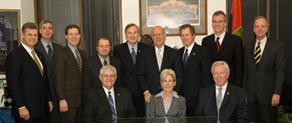Home team goes to bat for NBAF
State leaders from both sides of the aisle joined Kansas' congressional delegation in February to support the state’s bid for the National Bio and Agro-defense Facility.
 A site at K-State is one of six being considered nationally by the Department of Homeland Security.
A site at K-State is one of six being considered nationally by the Department of Homeland Security.
The gathering in Washington, D.C., showed Kansas' commitment to a project that, if realized, will capitalize on K-State’s research strengths even as it increases the state’s scientific resources.
Two years ago, the Department of Homeland Security issued a call to communities interested in becoming home to a 520,000-square-foot biocontainment lab charged with tackling threats to the food supply and public health.
K-State already had a history of working on just such challenges. In early 1999, K-State launched the Homeland Defense Food Safety Security and Emergency Preparedness Program. Later that year, the U.S. Senate’s Emerging Threats Subcommittee invited Jon Wefald, K-State’s president, to testify about the threat of agricultural bioweapons. And K-State had long been active in the USDA-funded Food Safety Consortium. The university created the National Agricultural Biosecurity Center in 2001 and, more recently, completed the Bio-
security Research Institute in Pat Roberts Hall.
Today more than 150 K-Staters work in the arenas of food safety and animal health, and more than $70 million has been invested in related research since 1999.
The university's agricultural heritage and its central location in a region bustling with bioscience activity make Kansas a strong contender for NBAF. Homeland Security recognized those advantages last summer by putting K-State on the short list of six potential sites.
The next step in the selection process comes in May with a draft of an environmental impact statement, at which time the Department of Homeland Security will hold public meetings. A final decision is expected in October.
Photo: Kansas goes to Washington: U.S. Rep. Todd Tiahrt (standing, from left), Manhattan Mayor Tom Phillips, U.S. Sen. Sam Brownback, Kansas Senate Minority Leader Anthony Hensley, U.S. Rep. Dennis Moore, U.S. Sen. Pat Roberts, Kansas House Minority Leader Dennis McKinney, Kansas Lt. Gov. Mark Parkinson, U.S. Rep. Jerry Moran. Seated: Speaker of the Kansas House Melvin Neufeld, Gov. Kathleen Sebelius, and Kansas Senate President Steve Morris. Also present at the meeting in Roberts’ office was U.S. Rep. Nancy Boyda.